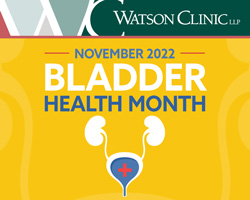 Laughing, exercising or not being able to find a bathroom quickly enough shouldn't make you leak urine. Yet that's just what happens every day to countless women who are twice as likely as men to have trouble controlling their bladders.
Laughing, exercising or not being able to find a bathroom quickly enough shouldn't make you leak urine. Yet that's just what happens every day to countless women who are twice as likely as men to have trouble controlling their bladders.
It can be embarrassing to admit to a doctor that you're leaking urine, whether it's just an occasional accident or it's an ongoing problem that's disrupting your life.
But here's an incentive to speak up: Urinary incontinence (that's the medical term) is highly treatable. Now here's a look at a topic that should never be taboo.
Incontinence can occur with both genders, though it is significantly more common in women.
Why are women so vulnerable?
Pregnancy, childbirth and menopause can all weaken the pelvic muscles needed for bladder control. The urethra—the tube that takes urine out of the body—is also shorter in women than men. Consequently, it has less muscle. And if it's weakened or damaged, it's more likely to trigger incontinence.
Women can leak urine at any age. But it's more common later in life. In fact, more than 4 in 10 women 65 and older have trouble with bladder control. That's likely because dwindling levels of estrogen after menopause may weaken the urethra.
Staying dry
There are many effective treatments for incontinence, and often doctors advise the simplest and safest first. That might be trimming down if you're overweight, since extra pounds put pressure on your bladder. Or stopping smoking if you light up, since the habit can contribute to leaking.
Your doctor may also advise:
Doing Kegel exercises. These exercises involve tightening and relaxing the pelvic floor muscles that control urine flow. Practicing them can help you hold urine longer.
Treating constipation by eating more fiber. Constipation can make urinary incontinence worse.
Training your bladder. Gradually increasing the times between bathroom visits may help you hold more urine.
Changing your drinking habits. You'll be less likely to leak urine if you avoid carbonated drinks (such as soda), caffeinated drinks and alcohol.
If steps like these don't help, your doctor may talk to you about other options. Among them: medicine; medical devices; nerve stimulation; and, in some cases, surgery.
BPH and Incontinence in Men
Benign prostatic hyperplasia (BPH) is a common condition in men in which an enlarged prostate gland causes problems with the urinary tract. It is also sometimes called benign prostatic hypertrophy.
Here are five facts men (and the people who love them) should know about BPH.
1. BPH is not cancer. It also doesn't appear to increase the risk of getting cancer. But the early symptoms of BPH and prostate cancer are the same. These include:
• Frequent and urgent need to urinate, especially at night.
• Trouble starting a urine stream or making more than a dribble.
• A weak, slow, or stop-and-start urine stream.
• Feeling like you have to urinate, even after you just did.
• Small amounts of blood in the urine.
2. An enlarged prostate is very common in older men. About 50% of men have symptoms of BPH by age 60. About 90% of men have symptoms by age 85, according to the National Association for Continence.
BPH is the most common prostate problem in men older than 50.
3. No one is sure what causes BPH. But it may be hormones. Men produce the male hormone testosterone and female hormone estrogen throughout their lives. As men age, the amount of testosterone goes down. This leaves a higher portion of estrogen. One theory holds that it's this higher amount of estrogen that promotes growth of the prostate.
A different theory focuses on dihydrotestosterone (DHT). Some men continue to produce high levels of DHT as they age, even as blood testosterone levels decline. This theory contends that these higher levels of DHT encourage prostate cell growth.
4. Certain risk factors make it more likely that a man will develop BPH. These include:
• Being 40 or older.
• Having a family history of BPH.
• Being obese.
• Having heart and circulatory disease.
• Having type 2 diabetes.
• Not exercising.
• Having erectile dysfunction.
5. BPH can be treated. Treatment options for BPH include:
• Lifestyle changes. These can include limiting liquids, avoiding caffeine and alcohol, and doing exercises that work the pelvic floor muscles.
• Medicines to stop growth of or shrink the prostate. Or drugs to lessen symptoms.
• Multiple types of minimally invasive procedures to relieve symptoms.
• Surgery.
Watson Clinic's team of Family Medicine and Internal Medicine providers can help you decide the right remedies for you, but you need to talk about the problem first. Call 863-680-7190 to schedule an appointment.